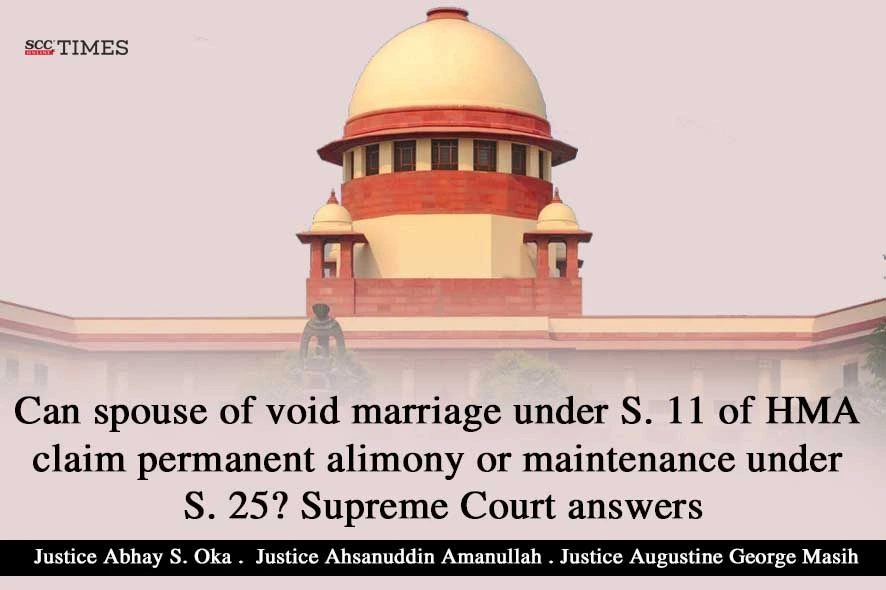Supreme Court: In a set of two civil appeals wherein reference was made to a Larger Bench to deal with conflicting views on the applicability of Sections 24 and 25 of the Hindu Marriage Act, 1955, (‘1955 Act’) whether alimony can be granted where marriage has been declared void, the Three Judge Bench of Abhay S. Oka*, Ahsanuddin Amanullah and Augustine George Masih, JJ. answered the issue in the affirmative. The Court held-
-
A spouse whose marriage has been declared void under Section 11 of the 1955 Act is entitled to seek permanent alimony or maintenance from the other spouse by invoking Section 25 of the 1955 Act. The grant of relief of permanent alimony can be granted or not always depends on the facts of each case and the conduct of the parties, as it is always discretionary.
-
Even if a Court comes to a prima facie conclusion that the marriage between the parties is void or voidable, pending the final disposal of the proceeding under the 1955 Act, the Court is not precluded from granting maintenance pendente lite provided the conditions mentioned in Section 24 are satisfied.
Analysis and Decision
(i) Is a spouse of a marriage declared as void by a competent Court under Section 11 of the 1955 Act entitled to claim permanent alimony and maintenance under Section 25 of the 1955 Act?
Perusing Section 5 in conjunction with Section 11 of the 1955 Act, the Court said that the following categories of marriages are void:
-
If one or both the parties to the marriage have a spouse living at the time of marriage;
-
The parties to the marriage are within the degrees of prohibited relationship unless the custom or usage governing each of them permits of a marriage between the two and
-
The parties are sapindas of each other, unless the custom or usage governing each of them permits of a marriage between the two.
The Court pointed out that the marriages covered by the above-mentioned categories become void at the inception- void ab initio as Section 11 provides for the grant of a declaration of a marriage as null and void.
Further, the Court noted that Section 25 of the 1955 Act confers a power on the matrimonial court to grant permanent alimony “at the time of passing any decree or at any time subsequent thereto”. The issue at hand revolves around the meaning of this decree.
The Court explained that the decree referred to in Section 25 of the 1955 Act is the decree as contemplated by Section 23, which provides for ‘decree in proceedings’. The Court enunciated that Section 23 deals with only the decrees granting reliefs under Sections 9 to 13 of the 1955 Act. From the language used under Section 23, the Court said that the ‘decrees in proceedings’ will not include the decisions dismissing the petitions seeking reliefs under Sections 9 to 13. The decrees passed under Sections 11 to 13 bring about a change of status of the parties to the marriage.
The Court said that while enacting Section 25(1), the legislature made no distinction between a decree of divorce and a decree declaring marriage as a nullity. Therefore, it will not be possible to exclude a decree of nullity under Section 11 from the purview of Section 25(1) of the 1955 Act.
The Court also referred to Chand Dhawan v. Jawaharlal Dhawan, (1993) 3 SCC 406 wherein, while interpreting ‘decree’ under Section 25 of the 1955 Act, the Court viewed that when by court intervention under the 1955 Act, affectation or disruption to the marital status has come by, at that juncture, while passing the decree, it undoubtedly has the power to grant permanent alimony or maintenance, if that power is invoked at that time. On the same lines, in Rameshchandra Rampratapji Daga v. Rameshwari Rameshchandra Daga, (2005) 2 SCC 33, it was laid down that the expression used in the opening part of Section 25 enabling the “court exercising jurisdiction under the Act” “at the time of passing any decree or at any time subsequent thereto” to grant alimony or maintenance cannot be restricted only to, decree of judicial separation under Section 10 or divorce under Section 13. When the legislature has used such wide expression as “at the time of passing of any decree”, it encompasses within the expression all kinds of decrees such as restitution of conjugal rights under Section 9, judicial separation under Section 10, declaring marriage as null and void under Section 11, annulment of marriage as voidable under Section 12 and divorce under Section 13.
The Court also noted that the appellant- husband relied on Yamunabai Anantrao Adhav v. Anantrao Shivram Adhav (1988) 1 SCC 530, wherein, it was held that when a marriage is a nullity by Section 25 of the 1955 Act, the spouse of such marriage is not entitled to get the benefit of Section 125 of the CrPC. The Court said that Yamunabai (supra) has no application to Section 25, as the remedy under Section 25 of the 1955 Act is completely different from the remedy under Section 125 of the CrPC. It confers rights on the spouses of the marriage declared as void under Section 11 of the 1955 Act to claim maintenance from the other spouse. The remedy is available to both husband and wife. The principles which apply to Section 125 of the CrPC cannot be applied to Section 25 of the 1955 Act.
“A grant of a decree under Section 25 of the 1955 Act is discretionary. If the conduct of the spouse who applies for maintenance is such that the said spouse is not entitled to discretionary relief, the Court can always turn down the prayer for the grant of permanent alimony under Section 25 of the 1955 Act. Equitable considerations do apply when the Court considers the prayer for maintenance under Section 25. The reason is that Section 25 lays down that while considering the prayer for granting relief under Section 25, the conduct of the parties must be considered.”
(ii) Whether in a petition filed seeking a declaration under Section 11 of the 1955 Act, a spouse is entitled to seek maintenance pendente lite under Section 24 of the 1955 Act?
The Court perused Section 24 of the 1955 Act which confers a power on a matrimonial Court to grant interim maintenance in pending proceedings seeking a decree contemplated under the 1955 Act. The Court pointed out that power is to be exercised pending the proceedings for a grant of a decree under Sections 9 to 13 of the 1955 Act.
The conditions for applicability of Section 24 are: (i) There must be a proceeding under the 1955 Act pending and (ii) the Court must come to a conclusion that either the wife or the husband, as the case may be, has no independent income sufficient for her or his support and the necessary expenses of the proceeding.
The Court held that-
Even if, prima facie, the matrimonial Court finds the marriage between the parties is void or voidable, the Court is not precluded from granting maintenance pendente lite provided the conditions mentioned above are satisfied. The grant of relief under Section 24 is discretionary as the Section uses the word ‘may’. While deciding the prayer for interim relief under Section 24, the Court will always consider the conduct of the party seeking the relief. It provides for issuing a direction to pay a reasonable amount.
CASE DETAILS
|
Citation: Appellants : Respondents : |
Advocates who appeared in this case For Petitioner(s): For Respondent(s): |
CORAM :






